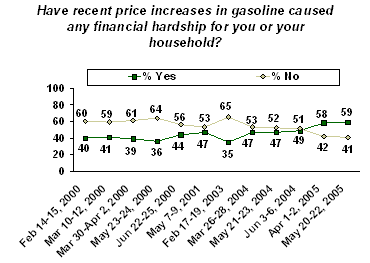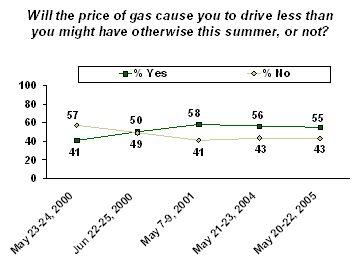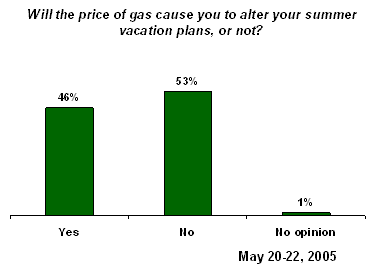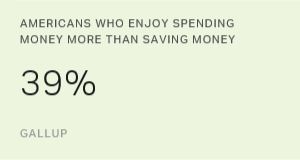GALLUP NEWS SERVICE
PRINCETON, NJ -- As summer unofficially starts this Memorial Day weekend, a recent CNN/USA Today/Gallup poll finds that nearly 6 in 10 Americans say the recent hikes in gas prices have caused financial hardship for their households. This is unchanged from April and continues to represent the highest percentage expressing this sentiment since Gallup first asked the question in 2000. More than half of Americans also say that gas prices will cause them to drive less than expected this summer, while a slightly lower percentage say gas prices will cause them to alter their summer vacation plans.
"Financial Hardship" Remains at High Level
The poll, conducted May 20-22, finds that 59% of Americans say the recent gas price increases have caused financial hardship for their households. Forty-one percent say these increases have not caused any financial hardship. This remains at the high level measured in early April this year, when 58% said the gas price increases had caused financial hardship and 42% said they had not.

Gallup first asked this question in February 2000 and has periodically re-asked it as gas prices have risen in recent years. At that initial point in 2000, 40% said price increases had caused a financial hardship. Not until this year did a majority of Americans say gas price increases were causing financial hardship. It is worth noting that this financial hardship percentage has stayed high even though gas prices have leveled off or declined in recent weeks in some parts of the country.
Certain groups of Americans are more inclined to say gas prices have caused financial difficulties in their households:
- More than 7 in 10 adults earning less than $30,000 per year say gas price increases are causing a financial hardship for their households. This compares with 62% of those earning between $30,000 and $75,000 and just 41% of those earning $75,000 a year or more.
- Younger Americans are much more likely than older Americans to report financial hardship, with 71% of 18- to 29-year-olds, 59% of 30- to 49-year-olds, and 54% of those aged 50 and older expressing this sentiment.
- Two in three women say the recent gas price increases have caused financial hardship, compared with just about half of men.
- Seventy-two percent of nonwhites say gas prices have caused hardship, while only 55% of whites feel this way.
- There are only modest regional differences, with Southerners just slightly more likely than those living elsewhere to say gas prices have caused hardship.
|
Gas Price Increases Causing Financial Hardship? |
||
|
|
|
|
|
Yes, caused hardship |
No, not caused hardship |
|
|
% |
% |
|
|
Gender |
|
|
|
Men |
51 |
49 |
|
Women |
67 |
33 |
|
|
|
|
|
Race |
|
|
|
Whites |
55 |
45 |
|
Nonwhites |
72 |
27 |
|
|
|
|
|
Age |
|
|
|
18- to 29-year-olds |
71 |
29 |
|
30- to 49-year-olds |
59 |
41 |
|
50 years and older |
54 |
46 |
|
|
|
|
|
Income |
|
|
|
$75,000 or more per year |
41 |
59 |
|
$30,000-$74,999 |
62 |
38 |
|
Less than $30,000 per year |
71 |
29 |
|
|
|
|
|
Region |
|
|
|
East |
55 |
45 |
|
Midwest |
58 |
42 |
|
South |
65 |
35 |
|
West |
56 |
44 |
Americans Plan to Drive Less This Summer, but Won't Alter Vacation Plans
Fifty-five percent of Americans say gas prices will cause them to drive less than they might have otherwise this summer, while 43% say prices will not cause them to drive less. These results are roughly the same as Gallup found last May. This measure reached its highest point in May 2001, when 58% said they would drive less. Although the level of financial hardship caused by high gas prices is at an all-time high, the effect of that hardship on summer driving plans is actually slightly lower than in 2001.

While a majority of Americans say they plan to drive less this summer because of gas prices, a smaller percentage will alter their summer vacation plans. Fifty-three percent of Americans say they will not alter their summer vacation plans, while 46% say they will. (The poll did not ask how many Americans were planning to take a vacation this summer, so some of the respondents may not intend to take a vacation.)

Americans living in lower-income households are much more likely than those in upper-income households to say they will drive less this summer and that they will alter their summer vacation plans. The poll did not find any difference by age on these two measures.
Survey Methods
Results in the current survey are based on telephone interviews with 1,006 national adults, aged 18 and older, conducted May 20-22, 2005. For results based on the total sample of national adults, one can say with 95% confidence that the maximum margin of sampling error is ±3 percentage points.
For results based on the 517 national adults in the Form A half-sample and 489 national adults in the Form B half-sample, the maximum margins of sampling error are ±5 percentage points.
In addition to sampling error, question wording and practical difficulties in conducting surveys can introduce error or bias into the findings of public opinion polls.

